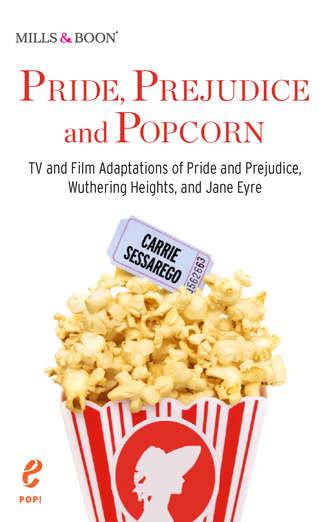
Полная версия
Pride, Prejudice and Popcorn
Michael Fassbender and Mia Wasikowska are both powerful actors who seem to be suffering from terrible direction. Fassbender is a great brooder, but he simply has nothing to do. He has no opportunities to show Rochester’s wit or menace or charm—he just broods, while looking sexy. Also, he cries a lot. The only notable thing about his role is that he’s the only Rochester I’ve seen who actually wears a nightshirt to bed. Mia has this wonderful calm, clear, penetrating gaze that is pure Jane, but she doesn’t have anything to do, either, except alternately weep and look calmly at things. When they are together, the couple stares at each other longingly, and speaks in low, repressed voices. Mia’s one great moment is when she discovers that St. John and the sisters are her cousins, and she lights up with joy. It’s the only moment in the movie where she seems fully awake.
A huge amount of the story is cut, most notably all the conversations that Jane and Rochester have that build their relationship, and most of Jane’s important lines about herself. Instead, there are long sequences of poor Mia wandering the moors, whimpering with hunger and despair. Granted, the cinematography is gorgeous. If you have to film someone wandering the moors, cinematographer Adriano Goldman is your guy.
This movie is a great example of a case where the story is filmed very prettily, and yet, all the meaning is leached away. There’s not much contact between Jane and Rochester, so there is no reason to think that they would fall in love—except for the fact that there appear to be only two men in England, and we know Jane will end up with the first one. Jane doesn’t grow very much and there’s no indication of why she is a role model for so many readers, or why the story is important. It’s just another story about a poor girl who marries a rich man and lives happily ever after.
The Miniseries
Jane Eyre, 1973—The One With Michael Jayston and Sorcha Cusack (BBC) (★)
In my notes for this adaptation, I have three words: bland, nice, faithful. Purists will delight in this series because it is faithful to a fault. Nothing is omitted and most of the lines come directly from the book. Jane even delivers quite a bit of her internal thoughts in voice-over, although sometimes the script adds lines to fully explain exactly how Jane feels at any given moment, which is a bit insulting to the viewer.
Readers, it is my painful duty to inform you that I failed as your reviewer. I watched the first two-thirds of the series and then gave up. It’s not because it’s awful, it’s simply boring. If I put all these adaptations on a spectrum, the Colin Clive/Virginia Bruce adaption would show just how thoroughly you can destroy your adaptation by changing too much of the source material, and this adaptation would illustrate the grave dangers of failing to change anything at all. Jane Eyre is a splendid book, but you can’t just throw the lines on the screen and call it a miniseries. It is deadly lifeless and dull, even as it is clearly made with a deep love for the text.
It doesn’t help that Cusack and Jayston seem like very nice but not terribly compelling people. Cusack is a lovely woman, and she sure seems like a nice person, but she lacks passion and drama. Jayston, likewise, seems smart, funny and nice. And the thing is, these characters aren’t “nice.” Jane is “good,” but she’s not simply nice—she has many layers. Rochester is certainly not “nice”—he’s sexy, menacing, kind, patronizing and mysterious by turns. I hate to criticize this series, because it truly seems that everyone who worked on it loved the book, but it is totally lacking in a sense of mystery or drama or passion. It does have a huge fan base among purists, though, and it is certainly very complete in its delivery of the book’s content.
Jane Eyre, 1983—The One with Timothy Dalton and Zelah Clarke (BBC) (★★★★)
This miniseries is the real deal. My personal favorite is the Ruth Wilson/Toby Stephens version (see the miniseries review that follows), but let’s face it, it’s Jane Eyre–lite. If that version is candy, then this version, with Timothy Dalton growling (growling!) with irritation, is like a really wonderful, nourishing loaf of bread warm from the oven.
I had grave doubts about being able to believe in Timothy Dalton as Rochester because he’s permanently marked in my brain as several hammy and delightful science-fiction/fantasy characters. Well, never underestimate Timothy Dalton, because as Rochester, he strikes just the right balance between subtlety and grandiosity, and tenderness and crankiness. He has a wicked temper and an even more wicked, and clever, sense of humor. He gets so cranky that he growls. Mysteriously, he sleeps fully dressed, including pants and vest, and yet he manages to make the one undone button of his shirt convey a greater sense of nudity than, well, actual nudity. Unlike other Rochesters, who tend to sport a post-fire eye patch and a hand bandage, he actually loses his hand and eye to the fire, and he’s real pissed about it. There’s no hiding how cruel he is to Jane and yet there’s also no denying how magnetic his personality is. It’s certainly not mysterious that Jane would be hopelessly attracted to him.
Конец ознакомительного фрагмента.
Текст предоставлен ООО «ЛитРес».
Прочитайте эту книгу целиком, купив полную легальную версию на ЛитРес.
Безопасно оплатить книгу можно банковской картой Visa, MasterCard, Maestro, со счета мобильного телефона, с платежного терминала, в салоне МТС или Связной, через PayPal, WebMoney, Яндекс.Деньги, QIWI Кошелек, бонусными картами или другим удобным Вам способом.


